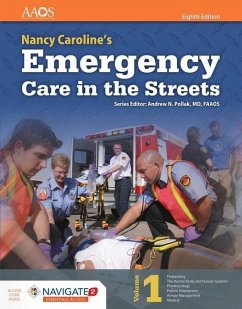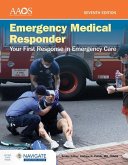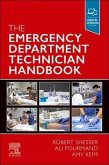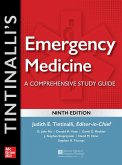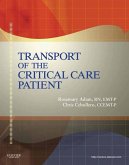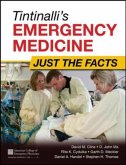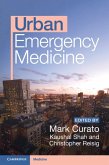Nancy Caroline's Emergency Care in the Streets, Eighth Edition is the next step in the evolution of the premier paramedic education program. This legendary paramedic textbook was first developed by Dr. Nancy Caroline in the early 1970s and transformed paramedic education. Today, lead editors Bob Elling and Barb Aehlert, with the American Academy of Orthopaedic Surgeons, are proud to continue this legacy and set the new gold standard for the paramedics of tomorrow.This fully updated edition covers every competency statement of the National EMS Education Standards for Paramedics with clarity and precision in a concise format that ensures student comprehension and encourages critical thinking. This iconic text emphasizes the ideal that becoming a paramedic is a continual pursuit of growth and excellence throughout an entire career. Concepts of team leadership and professionalism are woven throughout the chapters, challenging students to become more compassionate, conscientious health care professionals as well as superior clinicians.Evidence-Based Recommendations and ProtocolsMedicine is constantly changing and prehospital medicine varies across states and regions. The content of the Eighth Edition reflects the guidance and recommendations of an extremely experienced, geographically diverse group of authors, and its team of Medical Editors from the AAOS. Where possible, content is based on evidence, such as data from the field and studies published in the medical literature.Current, State-of-the-Art Medical ContentThe Eighth Edition meets and exceeds the paramedic National EMS Education Standards and reflects the National Model EMS Clinical Guidelines (NASEMSO), the National Registry Skill Sheets and Psychomotor Competency Portfolio, and Prehospital Trauma Life Support, Eighth Edition, from NAEMT and American College of Surgeons' Committee on Trauma. Where applicable, the authors and editors followed additional authoritative sources, such as national stroke guidelines. Last but not least, the Eighth Edition thoroughly addresses the 2015 ECC and CPR guidelines published by the American Heart Association. These updates went beyond a compression rate or depth change; the text has been completely updated to reflect all of the Guideline changes.Strong Application to Real-World EMSStudents who are studying to become paramedics are focused on helping the sick and injured. They need to know why information is important to learn. Through evolving patient case studies in each chapter, the Eighth Edition gives students a genuine context for the application of knowledge. This approach makes it clear how all of this new information will be used to help patients in the field. Opportunities to apply knowledge equip students to ultimately become better providers. Progressive case studies are followed by a comprehensive summary that answers the critical thinking questions raised throughout the case. The You are the Paramedic cases conclude with a Patient Care Report, showing the student exactly how the presented case would be documented.New to This Edition!Based on feedback from program directors and educators around the country, we added two new chapters to the Eighth Edition: Medical Terminology. Medical Terminology was previously addressed in the Documentation chapter, but educators strongly preferred that we dedicate a standalone chapter to this important topic.Career Development. Recognizing that the U.S. health care system, and the role of the paramedic in it, are rapidly evolving, we've added a chapter on career development. In addition to discussing the changing and expanding career opportunities for paramedics, this chapter presents nontraditional specialties that paramedics may need in the future to fill evolving roles in the healthcare system.
Hinweis: Dieser Artikel kann nur an eine deutsche Lieferadresse ausgeliefert werden.
Hinweis: Dieser Artikel kann nur an eine deutsche Lieferadresse ausgeliefert werden.

